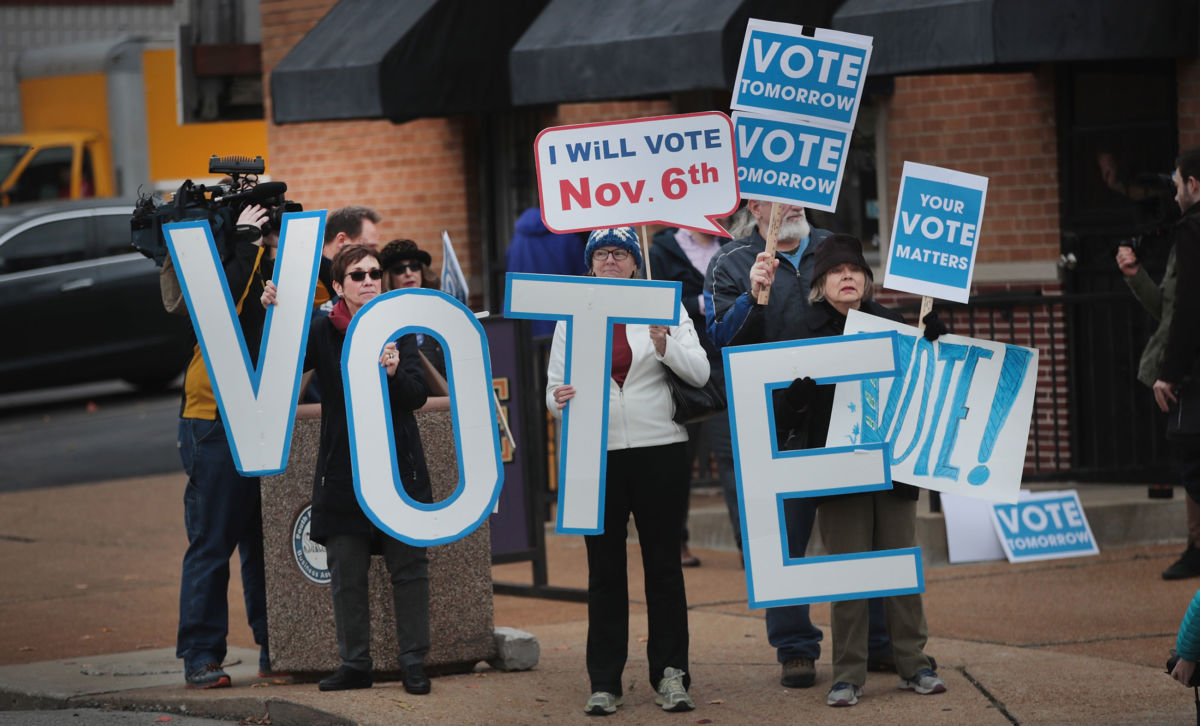Honest, paywall-free news is rare. Please support our boldly independent journalism with a donation of any size.
In two deep-red states, voters approved substantial raises for nearly 1 million of their fellow workers on Tuesday.
“Despite the rosy picture being painted by many politicians, voters are saying ‘enough’ to an economy that’s leaving too many struggling families behind,” Jonathan Schleifer, executive director of The Fairness Project, which provided financial and strategic support to the two ballot initiatives, said in a statement.
Arkansas voters approved a minimum wage increase, passing Issue 5 by 68.4 percent to 31.6 percent. The state’s minimum wage will now increase to $11 an hour by 2021, meaning nearly 300,000 workers, or almost a quarter of the state’s entire workforce, can expect an average annual raise of $1,520 each.
“The people of Arkansas have spoken,” Kristin Foster, campaign manager for the group behind the measure, Arkansas for a Fair Wage, said in a statement. “No one who works full time should have to live in poverty and struggle to make ends meet.”
That includes Amy Wilson, a single mother of three in Russellville who works as a custodian. “I work hard to support my family but even working full time sometimes it is just not enough to get by,” she said. “By raising the minimum wage, voters have made it a little easier for me to put food on the table and give my kids what they need to thrive…. With a minimum wage increase, I won’t have to worry about going over budget every time my kids ask me for a snack.”
Voters in Missouri also approved Proposition B by 62.3 percent to 37.7 percent. The measure will gradually raise the state’s minimum wage to $12 an hour by 2023. An estimated 677,000 workers in the state, also about a quarter of its workforce, now stand to see an extra $1,485 each annually, on average.
“Republicans, Independents and Democrats from across Missouri turned out to help workers, businesses and the state’s economy by voting to raise the minimum wage,” Carl Walz, campaign manager of Raise Up Missouri, which ran the campaign to pass Proposition B, said in a statement. “Today’s strong show of support sends a clear message that Missourians believe that no one who works full time should have to live in poverty and struggle just to raise their family, and that it is well past time to give low-wage Missouri workers a raise.”
Azoria Morales, a single mother in St. Louis who works full time for $8.50 an hour, agreed. “This is a huge deal for my family and so many others,” she said. “Right now, I can’t afford to pay my bills in full, so I pay just enough to keep the lights on. It feels like I’m barely keeping my head above water. People who work hard should be able to take care of their families — not be forced to live in poverty.”
The workers in both states who can now expect better pay are a lot like Wilson and Morales: predominantly women, over the age of 20 and working full-time jobs.
Advocates for higher wages have increasingly turned to the ballot as a way to raise wages while lawmakers stall. At the federal level, Congress hasn’t increased the minimum wage since 2009. That’s part of why pay has stagnated for most workers for so long, even as it’s increased for those who earn the most.
It’s the same story in Arkansas and Missouri. Both states have legislatures controlled by Republicans that have failed to increase the minimum wage legislatively in recent years.
Missouri voters mandated that their state minimum wage increase automatically with inflation in 2006, but that still brought it to just $7.85 this year, or only 60 cents above the federal wage floor. State lawmakers have voted down bills to increase the minimum wage every year since at least 2014, including two bills earlier this year that would have raised it to either $12 an hour or $15. Lawmakers went even further last year, approving a bill that repealed a $10 minimum wage increase that had been passed in St. Louis, prevented a $15 increase that had been passed in Kansas City, and blocked other cities from raising their wages.
In Arkansas, lawmakers voted down a bill in 2013 that would have raised the minimum wage to $8.25 an hour. So voters took to the ballot box shortly after, approving the most recent wage increase in 2014 that raised it to $8.50 an hour.
Ballot initiatives increasing the minimum wage tend to be popular. Voters haven’t shot down a single statewide measure since 1996. In 2016, the four minimum wage increases on the ballot passed with more support than either presidential candidate.
“Voters across the political spectrum are fed up with politicians who pay lip service to the dignity of work but do nothing to reward struggling, hardworking families,” Schleifer said. “When it comes to the minimum wage, the biggest gap isn’t between Republicans and Democrats; it’s between politicians who don’t want to raise the wage and the people they represent.”
Trump is silencing political dissent. We appeal for your support.
Progressive nonprofits are the latest target caught in Trump’s crosshairs. With the aim of eliminating political opposition, Trump and his sycophants are working to curb government funding, constrain private foundations, and even cut tax-exempt status from organizations he dislikes.
We’re concerned, because Truthout is not immune to such bad-faith attacks.
We can only resist Trump’s attacks by cultivating a strong base of support. The right-wing mediasphere is funded comfortably by billionaire owners and venture capitalist philanthropists. At Truthout, we have you.
Our fundraising campaign is over, but we fell a bit short and still need your help. Please take a meaningful action in the fight against authoritarianism: make a one-time or monthly donation to Truthout. If you have the means, please dig deep.
